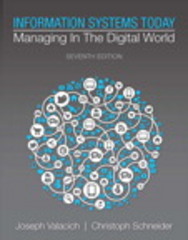Question
Please answer each of followingquestions What is the theory of bad apple and how does it apply to business ethics? Describe the differences between the
Please answer each of followingquestions
- What is the theory of "bad apple" and how does it apply to business ethics?
- Describe the differences between the two perspectives (prescriptive and descriptive approach) on ethics and their most prominent theories.
- What is the role of the formal and informal systems in creating an ethical organizational culture? Briefly go through both of these systems.
- Discuss the role of reward and punishment in creating an ethical organizational culture. How a manager should administer both rewards and disciplines?
- What is corporate social responsibility and why an organization should be socially responsible?
PART 2
Please answer each of following cases
Using your personal ethics statement as a guide, how do you handle this situation? Provide details on the steps you will take in addressing this issue and related this to your personal ethics statement. Be very specific about what you will say and the actions you have taken.
- Chantale Leroux works as a clerk for Avco Environmental Services, a small toxic-waste disposal company. The company has a contract to dispose of medical waste from a local hospital. During the course of her work, Chantale comes across documents that suggest that Avco has actually been disposing of some of this medical waste in a local municipal landfill. Chantale is shocked. She knows this practice is illegal. And even though only a small portion of the medical waste that Avco handles is being disposed of this way, any amount at all seems a worrisome threat to public health. Chantale gathers together the appropriate documents and takes them to her immediate superior, Dave Lamb. Dave says, "Look, I don't think that sort of thing is your concern, or mine. We're in charge of record-keeping, not making decisions about where this stuff gets dumped. I suggest you drop it." The next day, Chantale decides to go one step further, and talk to Angela van Wilgenburg, the company's Operations Manager. Angela is clearly irritated. Angela says, "This isn't your concern. Look, these are the sorts of cost-cutting moves that let a little company like ours compete with our giant competitors. Besides, everyone knows that the regulations in this area are overly cautious. There's no real danger to anyone from the tiny amount of medical waste that 'slips' into the municipal dump. I consider this matter closed." Chantale considers her situation. The message from her superiors was loud and clear. She strongly suspects that making further noises about this issue could jeopardize her job. Further, she generally has faith in the company's management. They've always seemed like honest, trustworthy people. But she was troubled by this apparent disregard for public safety. On the other hand, she asks herself whether maybe Angela was right in arguing that the danger was minimal. Chantale looks up the phone number of an old friend who worked for the local newspaper.
Questions: What should Chantale do? What are the reasonable limits on loyalty to one's employer? Would it make a difference if Chantale had a position of greater authority? Would it make a difference if Chantale had scientific expertise?
- Veritas Diagnostics is a medical diagnostics company specializing in adult genetic susceptibility testing for a range of heritable and complex genetic conditions. Their main business involves testing for the mutations associated with cystic fibrosis, hereditary kidney disease, as well as breast, ovarian and colorectal cancer. They have a well-staffed, well-run, sophisticated genetics laboratory capable of rapidly processing hundreds of samples for analysis on their many automated high-throughput DNA sequencers. Veritas considers their testing methodology to be the 'gold standard' and to that end, implement the latest testing technologies as they become available. Further, Veritas maintains good working relations with a number of leading university research laboratories, with whom they regularly verify their testing methods.
Veritas' chief clientele to date has consisted of hospitals, physicians, and private insurers ordering genetic testing for patients. The company has become known for providing quick, accurate, and confidential services at a competitive price. The Veritas Board of Directors has recently decided to expand the existing market and begin offering commercial genetic testing services direct-to-consumer through the company website.
As corporate Ethics Officer, you've been asked to work with the Vice President in charge of the new Direct-to-Consumer division to ensure that services are provided in an ethical manner. As far as the VP is concerned, the only ethical issue is consumer privacy, and given that Veritas already has privacy rules in place for dealing with physicians, hospitals, and insurance companies, the VP does not see that much needs to be changed for direct-to-consumer services.
Questions:Should Veritas Diagnostics provide in-house genetic counselling, and can this counselling be unbiased? If not, should arrangements be made with private and public genetic counselling programs, and who should pay for it?Should Veritas have a formal ethics policy statement dealing specifically with issues related to marketing genetic tests directly to consumers, and should it be online?
NEED FULL EXPLANATION WITH REFERENCES
Step by Step Solution
There are 3 Steps involved in it
Step: 1

Get Instant Access to Expert-Tailored Solutions
See step-by-step solutions with expert insights and AI powered tools for academic success
Step: 2

Step: 3

Ace Your Homework with AI
Get the answers you need in no time with our AI-driven, step-by-step assistance
Get Started


